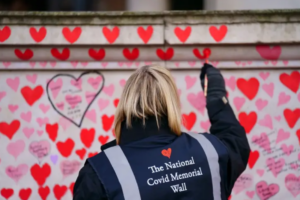The number of deaths in Brighton and Hove directly linked to the coronavirus pandemic stands at 570, according to the Office for National Statistics.
The ONS said that, of those, 342 people died in hospital, 173 in a care home, 27 in a private home and 18 in a hospice.
The figures – for deaths provisionally registered up to Saturday 12 March – also include nine deaths in a communal establishment other than a hospital, hospice or care home and one elsewhere.
The ONS figures include deaths up to Friday 4 March which were registered up to eight days later and with covid-19 mentioned anywhere on the death certificate.
They indicate that the deadliest week of the pandemic so far came in the seven days to Friday 29 January last year when 46 people lost their lives in Brighton and Hove.
The total number of covid deaths in Brighton and Hove were among 24,517 registered across the south east up to Saturday 12 March and 159,419 across England.
Separate figures from the government’s coronavirus daily dashboard indicate the rate of deaths in Brighton and Hove within 28 days of a positive coronavirus test – a different measure to that used by the ONS.
The cumulative death rate – since the start of the pandemic – stood at 160.4 deaths per 100,000 people in Brighton and Hove last Wednesday (16 March).
This was significantly below the cumulative rate of 251.1 for the whole of England.
New data from the ONS shows that Great Britain’s avoidable mortality rate in 2020 – the first year of the pandemic – was the highest since 2010.
These are typically deaths among people aged under 75 from causes that are considered avoidable, given timely and effective healthcare or public health interventions.
The latest avoidable mortality counts also include deaths due to covid-19.
Local authority figures, which span a three-year period, show that 1,567 deaths in Brighton and Hove were considered avoidable in 2018, 2019 and 2020.
This equated to a rate of 249.2 per 100,000 people which was down from 255.6 in 2017, 2018 and 2019.
The Health Foundation said that there had been notably higher excess deaths in Britain since the start of the pandemic compared with the rest of Europe, with some communities particularly hard hit.
The charity’s chief executive Jennifer Dixon said: “Working age adults in the poorest parts of the country were almost four times more likely to die from covid-19 than those in the wealthiest areas.
“We owe it to those who lost their lives and their families to understand why – and how to build greater resilience against future threats to our health.”
Dr Dixon added: “This means sudden threats like covid-19 as well as slow-burn threats like increasing obesity and mental health conditions.”
Marie Curie, the charity for people with a terminal illness, plans to commemorate the lives of those who died from covid-19 with a National Day of Reflection on Wednesday 23 March.
The event – two years after the Prime Minister Boris Johnson announced the first national lockdown – will include a minute’s silence at noon.
Marie Curie’s bereavement co-ordinator Claire Collins said that coming together on Wednesday would be a way to “reflect on our collective losses in a mindful way”.
She said: “There are still millions of people living with the deep trauma of losing a loved one during the last two years and we hope everyone finds comfort and embraces the day, whether you have had a close bereavement or not.”
As well as the minute’s silence at midday, the charity is encouraging people to shine a light at 8pm or put flowers in their window to show support.








